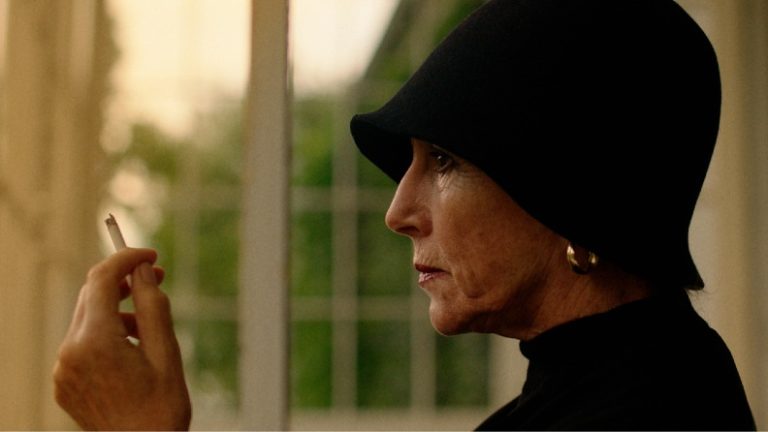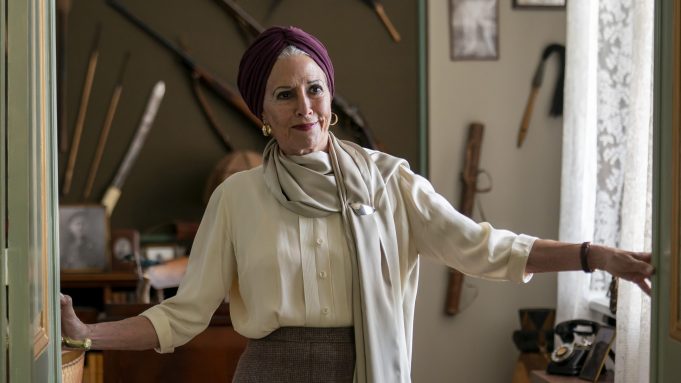
Bille August, the Danish Academy Award winning director, returns with a hauntingly beautiful depiction of Baroness Karen Christenze von Blixen-Finecke. The Pact — part of the Palm Springs International Film Festival and AFI European Union Films Showcase — is a remarkable adaptation of Bjørnvig’s bestselling memoir.
The story is set in the year 1948, when the sixty-three year old author of Out of Africa is a solitary literary sensation, afflicted by syphilis and a sense of emptiness. Suddenly she finds new motivation when she is presented the chance to shape a blooming and handsome aspiring writer: the thirty year old poet Thorkild Bjørnvig. Karen Blixen offers the young Magister a Faustian ‘pact.’ She tells him, almost as if it were a magic spell (or curse!), “Have faith in me and I will protect you.” With this promise of being provided with a higher gaze for inspiration and a wide network of connections, the writer gradually is held hostage by the living legend. Blixen becomes a sorceress-puppeteer, who manipulates the stories of those who surround her. She does so, from her the family estate Rungstedlund, that she turned into literary salon. Her protégé initially follows her guidance, but as her demands became increasingly nefarious he will have to choose between his family and the “pact.”

Bille August directs the brilliant Birthe Neumann playing Baroness Blixen, as an intellectually-driven Madame de Merteuil. She takes delight in determining the intrigues of the people she meets, as if they were characters that spilled out from her pen. Her appetite for living against what she considers petty bourgeois tradition characterises her meticulously devised dangerous liaisons. However, Thorkild Bjørnvig, embodied by the engaging Simon Bennebjerg, is not and does not come across as a victim. As a matter of fact, the real Bjørnvig recognised that meeting Karen Blixen gave him crucial creative freedom.
Their encounter coincided with a moment in their lives in which they both needed to find themselves. In 1931, Baroness Karen Blixen lost her farm in Africa and the love of her life, Denys Finch Hatton. Once she returned to Denmark she wrote the autobiography and soon became a world famous writer. In 1948, when she met Thorkild she was at the peak of her career and a potential winner of the Nobel Prize, but she felt a void that needed to be filled. Moulding Bjørnvig took care of Blixen’s urge, and he took benefit from being forged by the literary superstar. The teacher wanted her pupil to explore the world and live life to the fullest in order to be able to write about it. Through her perverse mind game, she managed to implant a very subtle teaching about the way we can construct our own persona, and that none of the fictitious ones we come up with may correspond to the image we believe ourselves to be. As Karen Blixen said, “Not by your face, but by your mask shall I know you.”
The riveting trait about the film is that there is a mutual dependency between Thorkild and Blixen. This agreement of spiritual faithfulness absorbs them both as writers, whose grasp for creating needs to reach beyond convention. A very effective moment to portray this is when there is a reference to Goethe’s The Holy Longing. Through this allegorical instant viewers can perceive how every storyteller withholds that sensation, a yearning for personal wholeness, that stands on the border between the transcendental and the mundane. That sense of beauty and search for enlightenment drives the narrative through a thrilling descent to a moral abyss, in exchange for cerebral edification. Little does it matter if the price to pay may have dramatic consequences on the personal sphere. As promised, Bjørnvig actually becomes a better writer. This idea is sustained by director Bille August, who clarifies, “as the film tries to tell, as a human you have an obligation to live out your potential. Everyone is endowed with a talent, and it is our job to live it out. Only that way you can be redeemed as a human being.”
Final Grade: B+

